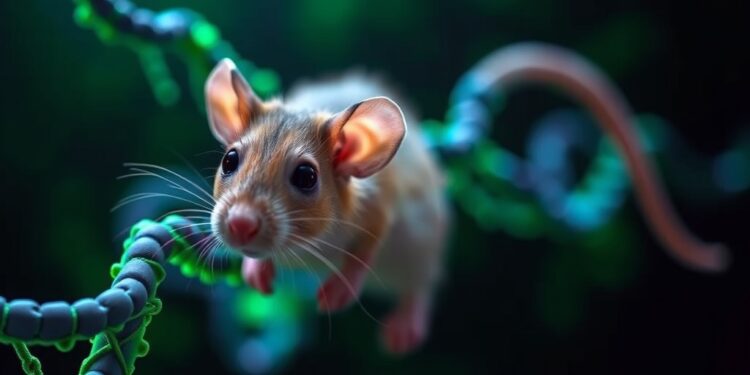Dravet syndrome and other developmental epileptic encephalopathies (DEEs) represent some of the most formidable challenges in pediatric neurology, characterized by a spectrum of debilitating symptoms that profoundly affect the lives of affected children and their families. These conditions can lead to an array of issues, including severe seizures, cognitive impairment, and in dire cases, sudden death. The complex interplay of genetic mutations underlying these disorders, particularly in the context of Dravet syndrome, predominantly revolves around alterations in the sodium channel gene known as SCN1A. However, a recent breakthrough by researchers at Michigan Medicine has shed light on an additional genetic player, SCN1B, which harbors its own clinical significance in the realm of DEEs.
The SCN1B gene plays a crucial role in the functioning of sodium channels, as variants in this gene have been linked to more severe manifestations of developmental and epileptic encephalopathy. To illustrate the dire implications of SCN1B mutations, it is important to note that mouse models with a complete deletion of this gene experience not only profound seizures but also an alarming rate of mortality—rising to a staggering 100 percent within just three weeks of birth. This alarming statistic underscores the critical necessity for therapeutic interventions that could potentially alter the trajectory of this devastating disorder.
In a groundbreaking study led by Chunling Chen, M.D., and Yukun Yuan, M.D., Ph.D., in collaboration with Lori Isom, Ph.D., the team sought to address this pressing clinical need by exploring gene therapy as a potential remedy for SCN1B-linked developmental epileptic encephalopathies. This innovative approach takes advantage of the ability to correct genetic deficiencies by directly replacing the defective gene. In their study, the researchers utilized mouse models to evaluate the effectiveness of a novel gene therapy aimed specifically at restoring the function of the SCN1B gene.
This gene therapy strategy has been labeled as a proof-of-concept, intended not only to showcase the potential for success in animal models but also to lay the groundwork for future clinical applications in affected human populations. One of the key findings from this research was the observable improvement in the survival of newborn mice that received the therapy. By restoring the expression of the beta-1 protein associated with SCN1B, researchers were able to inhibit the severity of seizures and enhance neuronal excitability within the brain.
The implications of the research extend beyond just increased survival rates. By elucidating the impact of SCN1B gene expression and its variants on therapeutic outcomes, the team has provided a critical framework for understanding how diverse genetic backgrounds can shape the efficacy of gene therapies. This knowledge is poised to inform future research efforts aimed at developing tailored treatment regimens for patients with varying degrees of genetic mutations affecting the SCN1B gene.
In addition to the advancements in gene therapeutic techniques, the study sheds light on the importance of understanding and further investigating the mechanisms by which the SCN1B gene contributes to neuronal function. Sodium channels, which are essential for generating and propagating nerve impulses, are heavily influenced by the protein types encoded by this gene. Hence, the restoration of SCN1B functionality holds promise not only in reducing seizures but also in improving overall neurological outcomes.
Navigating the complex landscape of genetic disorders such as Dravet syndrome and other DEEs requires a collaborative approach that combines molecular biology, genetics, and clinical research. The exploratory work conducted by the Michigan Medicine team exemplifies the synergetic potential of interdisciplinary research in tackling previously insurmountable health challenges. Their findings may serve as a foundation for the future exploration and application of gene therapies, with a vision toward providing hope for patients and families who face the devastating impacts of these genetic conditions.
This pioneering research has broader implications that could redefine our understanding of genetic contributions to neurodevelopmental disorders. Understanding the intricate interactions between various genes involved in neurotransmission and neuronal health can yield valuable insights into the prevention, diagnosis, and treatment of myriad conditions affecting children. The ability to manipulate gene expression effectively opens up avenues for developing more targeted therapies, personalized medicine, and potentially even preventive strategies that could change the lives of individuals predisposed to such disorders.
The journey toward the clinical application of gene therapies is fraught with challenges, including the need for extensive safety and efficacy evaluations prior to human trials. However, the discoveries emerging from this research underscore the importance of advancing our scientific knowledge in order to embark on a future where children afflicted with Dravet syndrome and other similar conditions may have access to transformative treatment options. As the field of gene therapy continues to evolve and mature, the hope remains that these innovations will translate into tangible improvements in the lives of patients and their families.
In conclusion, the work conducted by the Michigan Medicine research team marks a pivotal moment in the quest for effective therapies for developmental epileptic encephalopathies linked to genetic mutations. The proof-of-concept gene therapy not only demonstrates the potential of addressing the root causes of these conditions but also highlights the importance of continuing to explore the vast terrain of genetic research. By guiding future explorations in gene therapy and the molecular underpinnings of neurological disorders, this research may blaze a trail that enriches our understanding of human health and disease for generations to come.
Subject of Research: Gene therapy targeting the SCN1B gene for treating developmental epileptic encephalopathies.
Article Title: Novel Gene Therapy Offers Hope for Dravet Syndrome and Severe Epileptic Conditions.
News Publication Date: October 2023.
Web References: Journal of Clinical Investigation.
References: DOI: 10.1172/JCI182584.
Image Credits: Michigan Medicine.
Keywords: Dravet Syndrome, Developmental Epileptic Encephalopathies, Gene Therapy, SCN1A, SCN1B, Sodium Channels, Mice Models, Neurology, Pediatric Epilepsy, Health Innovations.
Tags: developmental epileptic encephalopathies treatmentepilepsy mortality rates in mouse modelsgene therapy for Dravet syndromegene variants and seizure severitygenetic causes of developmental disordersmouse models in epilepsy researchpediatric epilepsy advancementspediatric neurology breakthroughsSCN1A gene mutationsSCN1B gene significancesodium channel dysfunction in epilepsytherapeutic interventions for epilepsy





